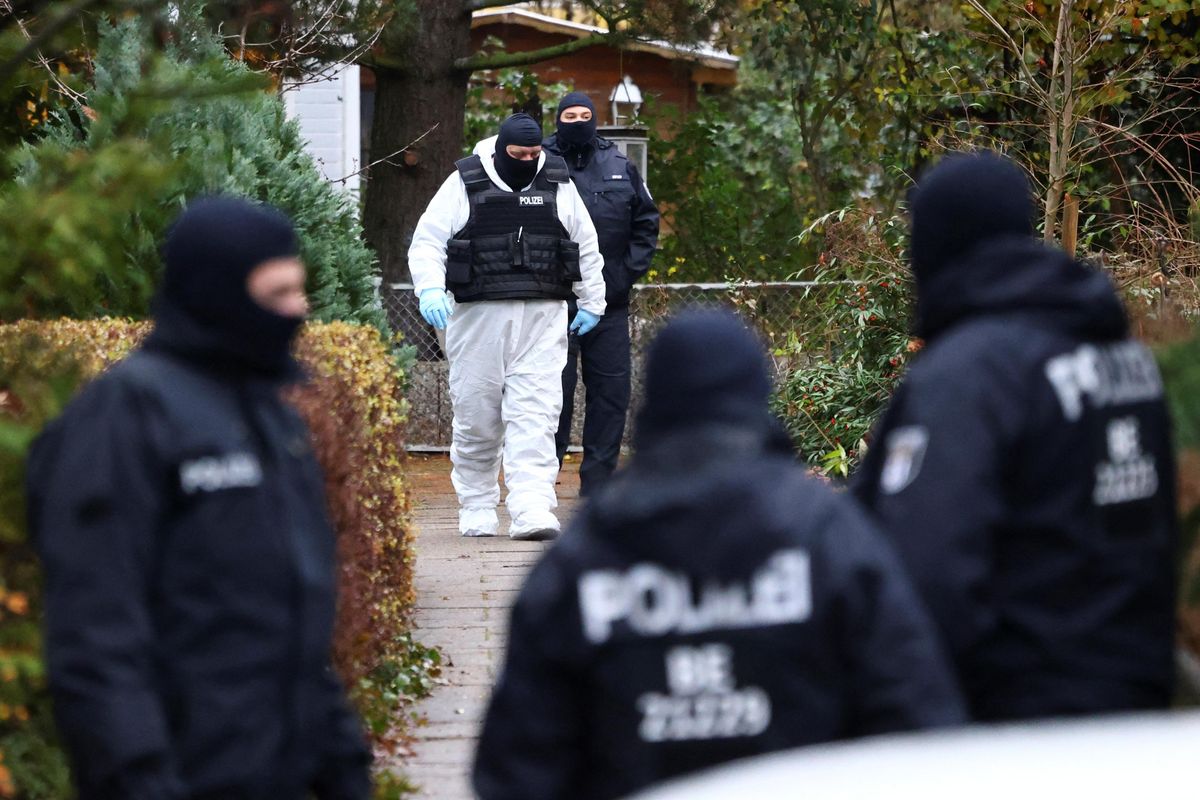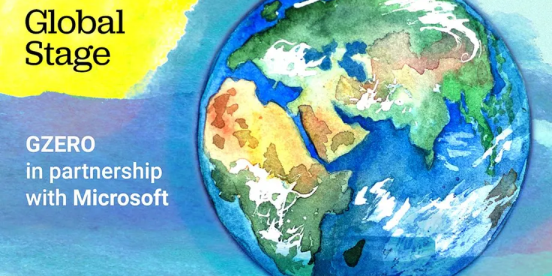We have updated our Privacy Policy and Terms of Use for Eurasia Group and its affiliates, including GZERO Media, to clarify the types of data we collect, how we collect it, how we use data and with whom we share data. By using our website you consent to our Terms and Conditions and Privacy Policy, including the transfer of your personal data to the United States from your country of residence, and our use of cookies described in our Cookie Policy.
What We’re Watching: German coup plotters, Peru’s self-coup, Xi’s Saudi visit, TSMC’s big investment

Police secures the area in Berlin after 25 suspected members and supporters of a far-right group were detained during raids across Germany.
A thwarted German Jan. 6?
Is there a single German word for "narrowly averted right-wing coup attempt"? We aren't sure, but on Wednesday German authorities arrested 25 people accused of belonging to a domestic terror organization with plans to overthrow the government and replace it with German nobility in a throwback to pre-Weimar times. Some 3,000 police conducted raids in several German states as well as in Austria and Italy, detaining people associated with the Reichsbürger, a right-wing German conspiracy group, the far-right Alternativ für Deutschland party, and at least one Russian citizen. You’ll likely remember that a member of the AfD – a euroskeptic party that has capitalized on anti-immigrant sentiment in recent years to grow its base – tweeted after the Jan. 6 riot at the US Capitol that "Trump is fighting the same political fight — you have to call it a culture war." Harboring beliefs that Germany is being run by a “deep state'' (sound familiar?), the group reportedly planned to launch an armed attack on the Reichstag, Germany’s parliament. This is just the most recent reflection of a far-right extremist problem in Deutschland. Last year, the German government placed the AfD under surveillance for its far-right extremist affiliations, and early this year the government found that more than 300 employees in Germany's security apparatus harbored far-right views.
Peruvian president ousted after trying his own coup
Peru's Congress voted Wednesday to remove President Pedro Castillo after he tried to dissolve parliament and declared a state of emergency to rule by decree in a bid to thwart an impeachment vote. Castillo's sudden move sparked mass resignations within his cabinet and the military, while his critics called it an autogolpe or self-coup like the one former President Alberto Fujimori successfully pulled off 20 years ago. Back then, the army helped the right-wing strongman stay in power for a decade — but this time the leftist Castillo had neither the support of the army nor Fujimori’s popularity. By nightfall, he was arrested. In his 17 months in power, Castillo, a former schoolteacher who rides on horseback and waves a giant pencil, has taken political instability to a record high even by Peruvian standards — he’s reshuffled his cabinet five times, had six criminal probes filed against him, and survived two impeachment bids. What happens next? VP Dina Boluarte was sworn in for the top job as Peru’s first female leader, but she may not last long: Peru churned through three presidents in a month in 2020 almost a year before Castillo won a nail-biter runoff election against … Fujimori’s daughter.
Xi goes to Saudi
China’s President Xi Jinping doesn’t leave the country often these days, but on Wednesday he began a three-day trip to Saudi Arabia. Xi, the leader of the world’s largest oil importer, is expected to sign trade agreements worth more than $29 billion with the Saudis, one of the world’s leading oil behemoths. In recent years, however, Russia has surpassed Riyadh as the top oil exporter to Beijing, and Saudi Crown Prince Mohammed bin Salman is keen to address that. The trip will also include a China-Arab and China-Gulf Cooperation Council summit. Indeed, the visit is a sign of the deepening relations between the two states at a time when relations between the US and Saudi Arabia, longtime allies, have steadily deteriorated due to personal animosity between President Joe Biden and MBS. Crucially, Beijing is now Riyadh’s largest trade partner, with exports to China surpassing $50 billion in 2021. And earlier this year, MBS and Xi cemented a $10 billion deal to create a Saudi Aramco oil refinery complex in China. To be sure, these close ties have been in the making for some time as Saudi Arabia has sought to diversify its trade portfolio, and Beijing has looked for new ways to expand its global economic clout. Washington will be watching very closely for new signs of cooperation.
Taiwan’s big investment
Twenty years ago, the US produced 37% of the world’s semiconductors, a product essential for the functioning of everything from smartphones and automobiles to digital-age weapons and fighter planes. Today, that percentage stands at just 12%, exposing the US economy and its military to supply-chain problems that create dangerous shortages. Adding to the risk, about 90% of the world’s most advanced chips are now produced in Taiwan, a self-governing island that Washington treats as an ally and Beijing insists is a breakaway Chinese province. These are two of the reasons why it’s a big deal for the US that the Biden administration and Taiwan Semiconductor Manufacturing Company, the world’s largest chipmaker, announced on Tuesday that the company would more than triple its planned investment in a new US plant to $40 billion – one of the largest foreign investments in US history. TSMC has also pledged to build a second plant by 2026 that produces some of the most sophisticated chips currently in production. The plan will leave the US less vulnerable to the kind of chip shortages it saw during the pandemic and could see during any future conflict between China and Taiwan. Nor will it hurt President Joe Biden that this investment will eventually create thousands of tech jobs in Arizona, one of the most hotly contested battlegrounds on the US electoral map.
